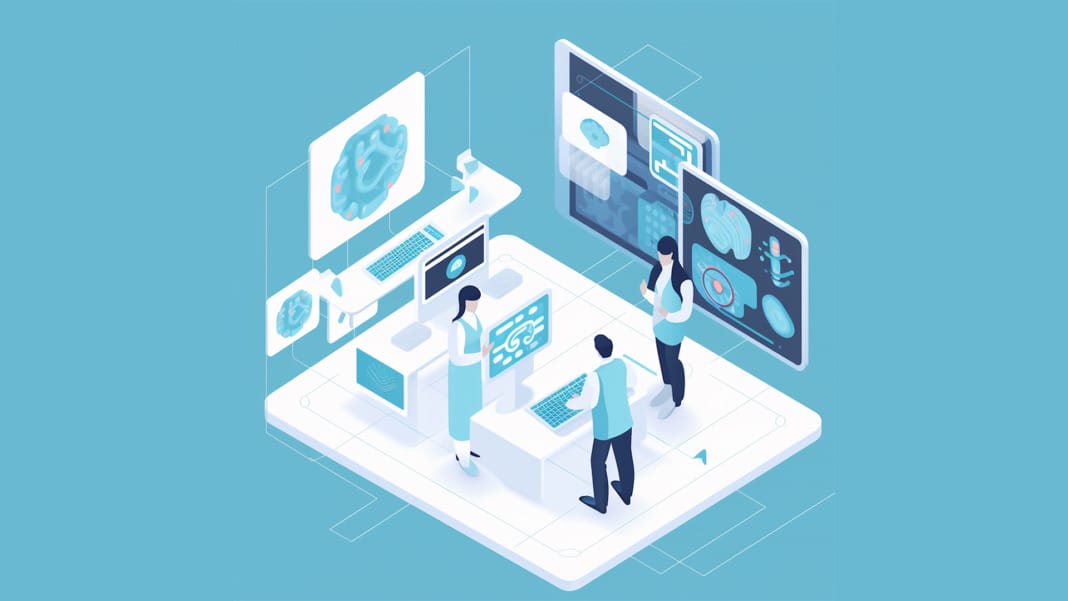You’re witnessing a pivotal moment in healthcare, marked by the integration of artificial intelligence (AI). With an anticipated investment exceeding US$30 billion by 2025, the healthcare sector is embracing a significant shift towards AI-driven solutions. This trend represents a financial commitment and a strategic move to leverage vast healthcare data for improved patient care. AI’s role in this transformation is crucial, offering enhanced data analysis, which paves the way for more effective and cost-efficient healthcare solutions.
In this evolving landscape, AI’s potential to revolutionise healthcare is immense. From automating administrative tasks to aiding in complex medical diagnoses, AI is proving to be an invaluable asset. Its ability to rapidly process and analyse large datasets can lead to quicker and more accurate diagnoses, better patient outcomes, and a more efficient healthcare system overall.
Moreover, AI’s integration into healthcare fosters a new era of personalised medicine. By analysing individual patient data, AI can help tailor treatments to each person’s unique health profile. This approach improves the effectiveness of treatments and minimises the risk of adverse reactions, leading to a more patient-centric healthcare experience.
AI’s diverse applications across the globe
Globally, the impact of AI in healthcare is evident in various forms. In China, the emergence of wearable health devices and AI-driven treatment plans is a testament to this trend. Companies like Huawei Technologies are leading the way with advanced health monitoring devices, while platforms such as Ping An Good Doctor demonstrate the power of AI in providing preliminary diagnoses. This highlights AI’s capability in proactive health management and early disease detection.
In Europe and the United States, the integration of AI into healthcare is also making significant strides. Digital innovation hubs in countries like Britain, France, and Germany are pushing the boundaries of medical AI. Meanwhile, in the US, companies like DeepMind are at the forefront of AI research in healthcare, focusing on disease detection and medical imaging. This progress is supported by stringent regulatory frameworks, ensuring that AI’s integration into healthcare is safe and beneficial.
Japan’s approach to AI in healthcare, particularly in elderly care, showcases how AI can address specific demographic challenges. Innovations in this area are not just about technological advancement; they’re about understanding and catering to the unique healthcare needs of an ageing population. This is a prime example of how AI can be tailored to meet the diverse needs of different groups within society, offering both innovative and compassionate solutions.
The double-edged sword of AI in healthcare
While the integration of AI in healthcare offers immense potential, it also presents significant challenges. Issues of patient safety, data security, and ethical dilemmas are at the forefront of this technological revolution. IBM’s Watson Health case, which faced challenges in its AI-driven cancer treatment solutions, underscores the need for a balanced approach. It highlights the importance of technological innovation, human oversight, and ethical considerations in healthcare AI.

These challenges necessitate a thoughtful approach to the deployment of AI in healthcare. Ensuring AI’s reliability and accuracy is paramount, as is protecting patient data. This requires a robust framework for ethical AI use, where technology complements rather than replaces human expertise. In doing so, the healthcare sector can harness the benefits of AI while mitigating the risks associated with its implementation.
Furthermore, integrating AI into healthcare raises questions about the future role of healthcare professionals. As AI takes on more tasks traditionally performed by humans, the skills and roles of healthcare workers will need to evolve. This transition presents an opportunity for healthcare professionals to focus more on patient care and less on administrative tasks, ultimately enhancing the quality of healthcare services.
Navigating the regulatory landscape
As AI permeates into healthcare, navigating the regulatory landscape becomes increasingly important. The rapid evolution of AI technologies often outstrips existing regulatory frameworks, leading to a complex landscape that countries like the US and EU are navigating with regulations such as the FDA guidelines and GDPR. These regulations ensure that AI’s integration into healthcare is safe, secure, and ethical. They represent a necessary step in balancing innovation with patient protection.
Addressing the challenges of AI in healthcare also involves ensuring transparency and accountability in AI systems. This is particularly important in disease diagnosis and treatment recommendations, where AI’s decisions can significantly affect patient health. Developing clear guidelines and standards for AI in healthcare is essential to build trust among healthcare professionals and patients.
Moreover, the international community needs to collaborate in shaping the global regulatory landscape for AI in healthcare. This involves sharing best practices, learning from each other’s experiences, and developing common standards that can be adopted worldwide. Such international cooperation is crucial to ensure that AI’s benefits in healthcare are realised globally while also addressing the ethical, legal, and social implications associated with its use.
The future: Balancing AI and human insight in healthcare
The future of healthcare with AI is about more than replacing human expertise but augmenting it. A synergistic approach is essential, where AI’s data-processing prowess complements human wisdom and ethical judgment. This balance is vital to maintaining the human-centric essence of healthcare while embracing technological advancements. Such a harmonious integration of AI and human insight is crucial for redefining quality healthcare in the 21st century, ensuring that the benefits of AI are realised without compromising the core values of patient care.
This future requires ongoing collaboration between technologists, healthcare professionals, and policymakers. By working together, these stakeholders can ensure that AI is developed and deployed to benefit patients and the healthcare system. This collaboration is also vital for addressing AI’s workforce changes, ensuring healthcare professionals have the skills to work effectively alongside AI.
Integrating AI into healthcare offers a promising path forward that combines the strengths of technology and human expertise. As AI continues to evolve and become more sophisticated, its potential to transform healthcare is limitless. However, realising this potential requires careful consideration of AI’s ethical, legal, and social implications and a commitment to maintaining the human touch in healthcare.





